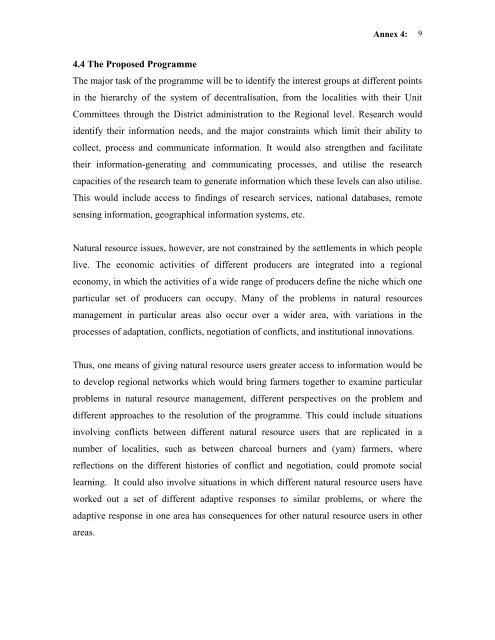Poverty Dimensions of Public Governance and Forest Management ...
Poverty Dimensions of Public Governance and Forest Management ...
Poverty Dimensions of Public Governance and Forest Management ...
Create successful ePaper yourself
Turn your PDF publications into a flip-book with our unique Google optimized e-Paper software.
Annex 4: 9<br />
4.4 The Proposed Programme<br />
The major task <strong>of</strong> the programme will be to identify the interest groups at different points<br />
in the hierarchy <strong>of</strong> the system <strong>of</strong> decentralisation, from the localities with their Unit<br />
Committees through the District administration to the Regional level. Research would<br />
identify their information needs, <strong>and</strong> the major constraints which limit their ability to<br />
collect, process <strong>and</strong> communicate information. It would also strengthen <strong>and</strong> facilitate<br />
their information-generating <strong>and</strong> communicating processes, <strong>and</strong> utilise the research<br />
capacities <strong>of</strong> the research team to generate information which these levels can also utilise.<br />
This would include access to findings <strong>of</strong> research services, national databases, remote<br />
sensing information, geographical information systems, etc.<br />
Natural resource issues, however, are not constrained by the settlements in which people<br />
live. The economic activities <strong>of</strong> different producers are integrated into a regional<br />
economy, in which the activities <strong>of</strong> a wide range <strong>of</strong> producers define the niche which one<br />
particular set <strong>of</strong> producers can occupy. Many <strong>of</strong> the problems in natural resources<br />
management in particular areas also occur over a wider area, with variations in the<br />
processes <strong>of</strong> adaptation, conflicts, negotiation <strong>of</strong> conflicts, <strong>and</strong> institutional innovations.<br />
Thus, one means <strong>of</strong> giving natural resource users greater access to information would be<br />
to develop regional networks which would bring farmers together to examine particular<br />
problems in natural resource management, different perspectives on the problem <strong>and</strong><br />
different approaches to the resolution <strong>of</strong> the programme. This could include situations<br />
involving conflicts between different natural resource users that are replicated in a<br />
number <strong>of</strong> localities, such as between charcoal burners <strong>and</strong> (yam) farmers, where<br />
reflections on the different histories <strong>of</strong> conflict <strong>and</strong> negotiation, could promote social<br />
learning. It could also involve situations in which different natural resource users have<br />
worked out a set <strong>of</strong> different adaptive responses to similar problems, or where the<br />
adaptive response in one area has consequences for other natural resource users in other<br />
areas.
















